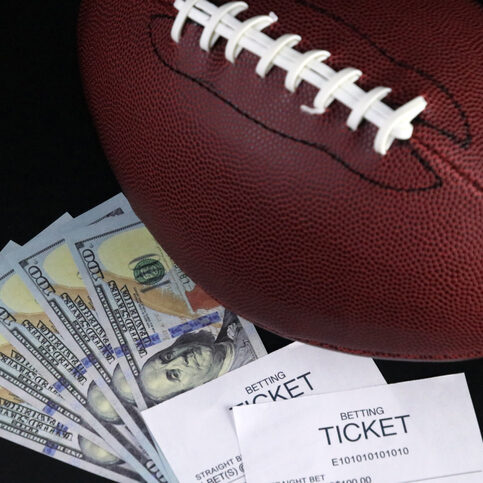Insights < BACK TO ALL INSIGHTS
Gambling, Sports Betting, and America’s Evolving View
Gambling, Sports Betting, and America’s Evolving View
By: Steven Eichorn
No less an authority than the Supreme Court has posited that “Americans have never been of one mind about gambling, and attitudes have swung back and forth.”[1] Shifting considerably over time, America’s views and social acceptance of gambling builds on a nearly 100-year trend towards the expansion of legalized gambling.
By the end of the 19th century, American society viewed gambling as a moral failure and vice, and it was largely banned throughout the country. Religious movements of the 19th and early 20th centuries that homed in on gambling in this way succeeded in outlawing most forms of gambling in many places. (Of course, even during that period of time, there was significant gambling activity on the black market and similar places). However, beginning in the 1920s and 1930s, and partially fueled by state revenue funding concerns during the Great Depression, state laws prohibiting gambling were gradually loosened.
Despite the gradual rollback of other gambling prohibitions, sports betting remained a taboo subject and frowned upon by society, which wasn’t ameliorated by the notorious Black Sox Scandal, in which eight members of the Chicago White Sox were accused of intentionally “throwing” the 1919 World Series, apparently in coordination with an underground bookmaker who paid them to fix the match.
This attitude against sports betting continued for many years. For instance, in 1992, Congress passed the Professional and Amateur Sports Protection Act (“PASPA”) to prohibit nearly all forms of state licensed sports betting, even at a time when casino and other forms of gambling were rampant throughout the country and undergoing widespread growth. Then-New Jersey Senator and former NBA star, Bill Bradley, spearheaded the bill “to maintain the integrity of our national pastime.”[2] Regardless of any moral appraisals, many were struck by the distinctly Nanny State nature of a federal ban on state activity.
Thus, the opposition to sports betting has long been entrenched in American society, as the industry faced strong and consistent opposition from multiple interested parties — from anti-gambling advocates concerned about its effect on young sports fans to integrity-based groups concerned with its potential adverse effect on sporting events, etc.
Historically, the NCAA and professional sports leagues voiced these concerns against the growing movement to legalize sports betting. Indeed, we see the residue of this concern even in the state statutes authorizing fantasy sports and sports betting, which often contain exceptions and carve-outs for college sports (or at least in-state college sports), amateur sports, and other youth sports, because of the perceived heightened integrity risk with amateur and youth sports.
Nonetheless, it appears the tide has turned. When the Supreme Court struck down PASPA in 2018, it resulted in explosive growth and widespread acceptance of sports betting. Nevada was the only state that offered sports betting in 2018, but it is now legal (in some form) in approximately two-thirds of the states. Strikingly, by 2023, 63% of US adults agreed that they have a positive opinion of sports betting. [3]
Sports betting has become a dominant part of the cultural experience for sports fans. Often, whenever fans watch or listen to a sports game or podcast, there are a significant and prominent number of advertisements to promote different sportsbooks or their odds on the relevant contests. Indeed, many stadiums themselves now prominently display signage promoting sportsbooks. The younger generation of bettors use their cell phones to place bets and to track player performances, and between the ease of placing these bets and the variety of inducements, like “guaranteed first bet winners,” betting on games has morphed into just another app on the phone.
The moral opposition to sports betting has largely dissipated, in part because geofencing to wall off bets from illegal states and enhanced Know-Your-Customer (“KYC”) has helped clamp down on participation by minors. But those geofencing walls are crumbling in the face of revenues – when a state government sees its neighbors cashing in on taxes, tourism, and jobs from sports betting, the others often follow suit with accepting an emerging regulated (i.e., taxed) industry within its own borders.
The sports betting industry is now engrained in U.S. sports culture. Sponsorships between sports betting companies and the leagues and/or individual franchises, players (e.g. LeBron James’ NFL partnership with DraftKings), and networks (e.g. ESPN launching an official sportsbook) evince this fact. For instance, according to an American Gaming Association survey, a record 68 million American adults (26%) were expected to bet $23.1 billion on Super Bowl LVIII, a 35 percent increase from 2023 estimates.[4] Unsurprisingly, by 2023, nearly 70 percent of US adults agreed that official sports betting should be legal everywhere in the United States.[5]
Many factors went into the about-face, but most fundamentally, gambling has turned into a political winner and can be touted as a needed revenue source to plug state budget deficits. Much like the Great Depression and weak state budgets helped fuel the expansion of gambling in the U.S., the current state budget shortages can persuade lawmakers to legalize sports betting and use the anticipated tax revenue to cover state budget shortfalls without cutting other state services. Thus, lawmakers can tell voters that legalized sports betting will increase economic activity and bring in new additional revenue, without making any painful cuts to existing services. For example, on June 11, 2018, Governor Phil Murphy of New Jersey sent out a tweet touting that, “[t]oday, we’re finally making the dream of legalized sports betting a reality for New Jersey. This is the right move for our state and will strengthen our economy.”
Slowly but surely, America transformed in the last hundred years from a country that outright prohibited gambling and viewed it as a moral failure to legalizing and partnering in its success to the benefits of its citizens. More importantly, sports betting has become part of the fabric of sports for many sports fans, which will likely lead to its continued growth and legalization in even more states.
[1] New Jersey Thoroughbred Horsemen’s Ass’n v. Nat’l Collegiate Athletic Ass’n, 584 U.S. 453, 458, (2018).
[2] S.REP. NO. 102-248 (1991).
[3] https://theharrispoll.com/briefs/whats-the-spread-americans-changing-attitudes-towards-sports-betting/
[4] https://www.americangaming.org/resources/super-bowl-lviii-wagering-estimates/
[5] https://theharrispoll.com/briefs/whats-the-spread-americans-changing-attitudes-towards-sports-betting/





